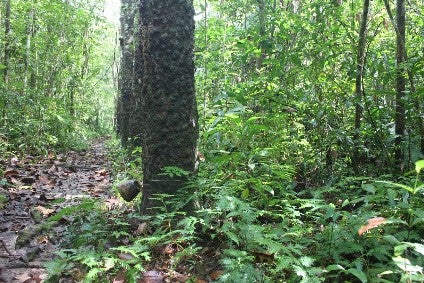
Global outdoor lifestyle brand Timberland is forging a partnership with regenerative design consultancy Terra Genesis International (TGI) to build what it claims is the world’s first regenerative rubber supply system for footwear, with plans to pilot a collection in 2023.
The brand, along with parent company VF Corporation and sister brands Vans and The North Face, is partnering with TGI in Thailand to build the supply system, which it says will eventually be open to brands across and outside the industry, aiming to significantly scale regenerative sourcing of rubber.
“At Timberland, we strive for a greener and more equitable future, and investing in regenerative agriculture is one of the most powerful levers we have to achieve this vision,” says Zack Angelini, senior manager of environmental stewardship for Timberland.
Rubber is typically grown in a monoculture; it uses a single type of tree, degrades biodiversity, and often uses chemicals or may involve exploitative labour practices, Timberland explains, adding monoculture rubber plantations are also a significant contributor to rainforest deforestation across Southeast Asia.
Based on local indigenous knowledge, regenerative rubber farming incorporates multiple tree species to mimic a natural forest ecosystem. This revitalises biodiversity and enhances ecosystem services such as soil health, water cycling, carbon sequestration, and the creation of favourable microclimates. This approach also provides a diversity of yields that farmers can rely on for multiple streams of income, leading to increased resiliency and long-lasting positive impacts for the community.
By supporting “train the trainer” programmes, Timberland and VF will help to scale local indigenous knowledge and transition more plantations to regenerative systems.

US Tariffs are shifting - will you react or anticipate?
Don’t let policy changes catch you off guard. Stay proactive with real-time data and expert analysis.
By GlobalDataThe TGI collaboration comes as part of Timberland’s efforts to achieve its vision for a greener future, under which the brand has set a goal for 100% of its natural materials to be sourced from regenerative agriculture by 2030.
“Our planet has a problem – there is too much carbon in the air and not enough in the ground,” it explains. “Regenerative practices mimic nature, enabling the land to pull more carbon out of the atmosphere and efficiently store it in the ground, where it can rebuild the structure of the soil, leading to healthy, hydrated, fertile ground – and ultimately, net positive impacts for the land and the farmers.”
Luke Smith, CEO of TGI, adds: “We are grateful that, through our partnership with Timberland and VF Corporation, we can move this vital regenerative process forward. While the transformation from rubber monocultures to regenerative farming on one farm is impressive, as the shift spreads wider, it is likely to have significant social, ecological and economic impacts in Thailand.”
Timberland plans to pilot its first regenerative rubber footwear in 2023.
Meanwhile, the brand is also expanding upon its growing regenerative leather footwear offerings for spring, with the new Greenstride Solar Wave EK+ Collection. In addition to regenerative leather in the uppers, GreenStride comfort soles are made of 75% renewable materials (a combination of sugar cane and natural rubber from trees). They are Earthkeepers Edition styles, marked with an EK+ to reflect Timberland’s pinnacle eco-innovations.
Later this summer, the Timberland PRO line will introduce its first regenerative leather boot, the Gridworks EK+.
As Timberland rapidly expands its regenerative leather supply chain, the brand hopes to use its global scale and sourcing arm to incentivise the transition of more farmers to regenerative agriculture across the world.
It is also launching a multidisciplinary campaign across an ecosystem of social media platforms such as Instagram, TikTok and Clubhouse, to inspire and educate consumers about the power of regenerative agriculture to heal the planet.
“As a consumer-led brand with a vision to build an equitable and green future, Timberland is perfectly placed to translate the concept and benefits of regenerative agriculture to the next generation,” says Drieke Leenknegt, global vice president of marketing for Timberland.
“Transmedia storytelling allows us to translate the ins and outs of regenerative practices in unique and different ways.”
Last week, sister brand Vans pledged a series of new global sustainability commitments that will see it move towards creating circular products and systems that use regenerative and recycled materials, designed to reduce waste and keep products in use and out of landfills.




